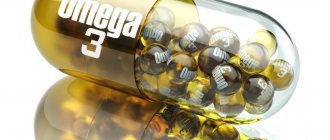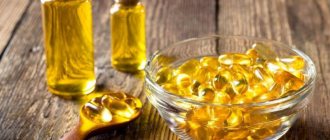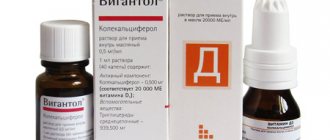What are the benefits of fish oil
Fish oil contains vitamins A and D, omega-3.6 fatty acids
The most valuable components of fish oil are vitamins and omega-3 fatty acids.
- Vitamin A. Nourishes the skin and nails, makes hair stronger and more voluminous. With its deficiency, nails peel, hair falls out or grows poorly, the skin dries out and a feeling of tightness appears. Vitamin A rejuvenates the body, improves the condition of the mucous membranes of the respiratory and digestive systems.
- Vitamin D. Helps with the absorption of calcium and phosphorus. They are essential for strong bones and teeth. In combination, vitamins normalize vision, improve color perception, and the ability to see in the dark.
- Omega-3. 20% of calories received per day should consist of this acid. It provides energy, promotes rapid metabolism, and reduces the risk of heart disease. This acid can only be obtained from the outside; the body does not produce it. It is found in large quantities in fish oil.
The use of fish oil helps with 3 types of cancer:
- mammary gland;
- colon;
- prostate.
Fish fat:
- reduces the risk of cancer cells;
- normalizes cholesterol levels in the blood and reduces the amount of triglycerides;
- helps fight AIDS;
- prevents the development of diabetes.
The effect of fish oil on the cognitive-behavioral characteristics of a child
A lack of omega-3 acids has a proven role in the development of attention deficit hyperactivity disorder (ADHD). Therefore, the question of why children need fish oil has an obvious answer - supplementing the diet with it helps compensate for behavioral problems and learning difficulties. Research shows that almost half of children who regularly consume omega-3s have improved their reading and writing abilities. How it works?
Omega-3 acids are absorbed by the membranes of nerve cells and neurons. Impulses are better transmitted between them, and the function of receptors located on the membranes of neurons improves. Omega-3s are involved in the formation of nerve cells, the restoration of neurons and their environment, the prevention of damage to nervous tissue, and protection from oxidative stress. That is why fish oil, namely the PUFAs it contains, is so necessary for the development of the baby’s brain.
Many researchers have noted a significant relationship between increasing docosahexaenoic acid (DHA) levels and improving performance on attention tests. Therefore, PUFAs affect the cognitive abilities of children, improve cognitive processes, and participate in the maintenance and timely development of thinking processes.
Who should take it?
Fish oil is useful:
- for cardiovascular diseases;
- hypertension;
- autoimmune diseases;
- tuberculosis;
- hypovitaminosis;
- under stress;
- osteoporosis;
- when vision decreases with age;
- for the prevention of heart attack;
- for children, pregnant and lactating women - only after consultation with a doctor;
- to increase life expectancy.
For children
Fish oil is essential for a growing body
A child's growing body needs fish oil. It is responsible for the growth of bones, the formation of the skeleton, and teeth. It affects mental development, as it improves blood flow to the brain and dilates blood vessels.
It should be given to children with hyperactivity: they will become more diligent and it will be easier for them to concentrate. Regular intake of fatty acids improves fine motor skills.
In infants, vitamin D prevents the development of rickets. According to research results, children who were six months behind their peers, after a course of fish oil lasting 3 months, caught up with their comrades in mental development.
Fish oil in courses of 2-3 weeks
Fish oil was mandatory for children in schools and kindergartens during the Soviet era - until 1970. Since then, mass consumption of the product has ceased, which, according to academic researchers, has led to the shortage problems today.
However, pediatrician, chief physician of the medical center Evgeny Timakov, in a conversation with Moscow 24, noted that in general, the use of fish oil for medical purposes has not been abandoned. “No one left him in clinical practice. This is how fish oil is prescribed. They simply abandoned its mass use - since the industry that now produces it is not cheap. And launching it into mass use will probably make the process of preventing various diseases more expensive,” added the portal’s interlocutor.
Today, fish oil is sold in capsules that do not have an unpleasant odor and are easy to swallow. Doctors consider this a good alternative to the Soviet form of natural medicine. And in general, there are only positive reviews about the benefits of fish oil. “It contains fat-soluble vitamins, such as vitamin A, which is needed for skin and vision, vitamin D, vitamin E, small doses of vitamin K. All this is needed for the body, to strengthen the immune system, for the development of the child’s body,” Timakov explained . However, the portal’s interlocutor spoke out against a full return to the practice of the 50s.
I am absolutely not against giving children fish oil in capsules, but in courses - for two to three weeks with breaks. Moreover, it’s good to do it en masse. Evgeniy Timakov
pediatrician, vaccinologist, chief physician of the medical center
The doctor recalled that constant use of such a supplement creates a large load on the liver. Thus, this preventative method is good, but in moderation.
Photo: depositphotos/areeya
Contraindications and side effects
For some diseases, taking fish oil is prohibited. These include:
- allergy;
- thyroid diseases;
- stomach;
- liver and kidneys;
- gallbladder;
- hypervitaminosis;
- hemophilia;
- vegetative-vascular dystonia with low blood pressure.
The drug should not be taken on an empty stomach. This may cause stomach upset.
Sometimes long-term use of cod liver supplements leads to hypovitaminosis. It is accompanied by nausea and abdominal pain. In case of any discomfort, the drug should be discontinued.
Omega-3 Fish Oil Madre Labs
This is a high-quality fish oil product at an affordable price. In addition to all the benefits of omega-3 listed above, fish oil has a positive effect on sexual function in men. The fact is that fish oil reduces the production of the nervous tension hormone cortisol, which has a bad effect on reproductive health. Vysokocon contains 80% omega-3, and this is the best result compared to other manufacturers. One package of the drug will last for a month, since you only need to take one capsule per day. Madre Labs Omega-3 Fish Oil is molecularly distilled in Germany, and the capsules are manufactured in America and tested for contaminants. The capsules are easy to swallow despite their size.
Read also: Top 10 balanced vitamin complexes for pregnant women. The best vitamins for pregnant women by trimester.
Popular pharmaceutical drugs
High-quality fish oil says “medical grade.” Avoid bottles labeled "food grade". Check the expiration date before purchasing.
The table shows the most popular drugs.
| Biocontour | Dietary supplement, release form – gelatin capsules. For children - chewable ones with flavoring additives. | The average price is 64 rubles per 100 capsules. |
| Kusalochka | Chewable capsules with flavors for children. | 150 rubles for 60 capsules. |
| Tula | Liquid preparation. | 150 rubles per 100 ml. |
When purchasing, ask for a product certificate. It indicates the type of fish from which the fish oil is obtained and the production time.
Super Omega 3-6-9 NOW Foods
Another vitamins that, in addition to omega-3, also contain omega-6 and omega-9. NOW Foods Super Omega 3-6-9 is a combination of fish oil, flax oil and borage oil. This complex has an excellent effect on the functioning of the cardiovascular, nervous and immune systems, improves memory and the condition of the skin, hair, and nails. All components of the dietary supplement are excellent antioxidants that protect the body and remove various harmful substances from it. If you are pregnant or nursing, be sure to consult with your doctor before taking NOW Foods Super Omega 3-6-9. This is an inexpensive fish oil preparation, the capsules are soft, easy to swallow, there are 180 pieces in a jar, and this will last for a long time.
How to use
Fish oil should be taken in courses
Fish oil should be taken with food.
The daily intake of omega-3 is 1000-1500 mg. Containing 350 mg per capsule, take 3 per day. This amount of food supplement can be taken continuously. But the use of courses is considered more effective.
For medicinal purposes, the dose should be increased to 5 capsules per day. The course usually lasts a month and can be repeated 3-4 times a year.
Athletes should take 5-6 capsules per day during periods of intense training.
The gelatin capsule should not be left in the mouth. When the capsule begins to dissolve, it becomes more difficult for it to pass through the esophagus.
The liquid preparation can be given to children from 4 weeks of age. Children under one year old should not be given fish oil without a doctor's permission. Dosage at this age is 3 drops 2 times a day. After a year, the dose can be increased to a teaspoon per day. From 1 to 6 years – 2-3 teaspoons. 6-7 years – 2-3 tablespoons. Children over 6 years of age are allowed to take the drug in capsule form.
Omega-3 deficiency pandemic
Not so long ago, scientists from the Peoples' Friendship University of Russia and Moscow State University. Lomonosov spoke about the results of a study conducted in collaboration with two private clinics. For four years, doctors monitored a group of 1,361 patients aged 0 to 91 years, and more precisely, the level of Omega-3 in their blood.
“We identified Omega-3 PUFA deficiency in 75.4 percent of patients, with the most severe deficiency in children and adolescents under 18 years of age. This indicates not only a deterioration in the quality of nutrition, but also a lack of medical culture and knowledge about the need to compensate for the deficiency of Omega-3 PUFAs both among patients and among doctors,” said the head of the department of endocrinology at the Peoples’ Friendship University of Russia, Professor Svetlana Kalinchenko, who also was one of the authors of the study.
In the study, scientists found Omega-3 deficiency in the following groups:
- below 4% (with a norm of over 8%) – in children under 17 years of age
- 6% – aged 18 to 44 years
- 7.3% – aged 45–59 years
- 6.9% – aged 60–74 years
- 8.3% are aged from 75 to 90 years.
*the highest prevalence of moderate Omega-3 deficiency was found in 54% of children.
Speaking about the results of the study, scientists called the identified deficit generally quite high. According to Professor Kalinichenko, about 70 percent of adolescents have metabolic and hypoxic disorders “caused by a deficiency of Omega-3 PUFAs.” According to the speaker, these children are at risk for many diseases, including infertility.
Compatibility with other drugs
Many are interested in the combination of fish oil with blood thinning medications: heparin, aspirin and others. When used together, there is a risk of bleeding. If the daily dose is small, then the risk is minimal and does not exceed the benefit that the body will receive from the drug.
In any case, the simultaneous use of these drugs should be under medical supervision.
Taking fish oil with hypertension medications can significantly lower blood pressure. The risk of complications is very small, but you should not provoke them.
What diseases is fish oil used to prevent?
Pay attention to omega-3 to:
- prevent cancer;
- reduce inflammatory processes in the body;
- slow down the aging of the body;
- stimulate cell recovery;
- improve the functioning of the reproductive system (both in women and men);
- reduce the risks of stroke, heart attack, hypertension;
- increase muscle tone;
- maintain optimal body weight;
- improve calcium absorption;
- strengthen the immune system.
Read also Vitamins for hair loss: 10 of the best Review of the best vitamins for hair.
Fish oil and fish oil, differences
At first, fish oil was obtained mainly from cod liver. As a valuable source of vitamins A and D, it was prescribed to adults and children in the autumn-winter period for general strengthening of the body, prevention of rickets and ADHD, heart and vascular diseases, age-related visual impairment, osteoporosis and other diseases associated with a lack of these substances. The deterioration of the ecology of water resources has forced manufacturers to think about the safety of this product, because dangerous toxins that contaminate water bodies are deposited in the liver.
Therefore, fish oil began to be produced from fish muscle tissue. The vitamin content in it is slightly lower than in liver fat. But it is characterized by a low content of dangerous toxins and heavy metals, which are abundant in fish liver, and contains essential Omega-3 fatty acids. Manufacturers always emphasize the difference between liver and muscle fat in the name. Often, oil from fish muscle tissue is called fish oil, sometimes fish oil or ichthen oil.
When choosing this product, you need to pay attention to the composition and name. If the packaging or instructions indicate “Liver oil” is fish oil, the label “Fish body oil” means that the fat is obtained from adipose tissue located in the flesh of fish. Some pharmaceutical companies produce a mixture of fish and fish oils and enrich it with various beneficial additives, such as vitamin E. They produce this fat in liquid form. It is a transparent oily liquid of light yellow color, which has a specific odor, without bitterness, with a fishy taste. Pharmacies offer a wide selection of products in capsules; when consumed, a person is relieved of the unpleasant smell and taste.
Selection and storage
When purchasing fish oil, you need to pay attention to what it is made from. It is better to give preference to oil squeezed from fish meat. The label or instructions for use must be marked “medical”. When purchasing a product in liquid form, it is better to have it in a dark glass container. It is important to pay attention to the production date. The shelf life of fish oil is 2 years if storage conditions are met.
Today, quite a few pharmaceutical companies produce fish oil; it is difficult to choose one of them. Norwegian manufacturers of this product have proven themselves well. In Russia, fish oil produced in Arkhangelsk and Murmansk is in good demand.
Pacific omega-3 + AGE complex from Doctor Sea
This fish oil preparation contains purified, highly concentrated omega-3, as well as alkylglycerols (esters of polyunsaturated fatty acids). The “Pacific Omega-3 + AGE complex” contains a phospholipid form of omega-3, which is very well absorbed by the body. The basis of the drug's ingredients is not fish, but squid (therefore there are no heavy metals and toxins). Omega-3 strengthens the cardiovascular system, the nervous system, improves brain function, and stimulates the immune system. Alkylglycerols help the body resist various diseases. Capsules "Pacific Omega-3 + AGE complex from Doctor Sea" are easy to swallow and are well absorbed. But you need to drink 8 capsules a day, which is not very convenient.
Other uses
Despite its high calorie content, fish oil is the best helper for those who want to lose weight or build beautiful muscles. This product speeds up metabolism; its regular use in conjunction with training increases the rate of fat burning by 10–15% and significantly improves the physical performance of athletes.
Fish oil is used in home cosmetology. To rejuvenate the skin and improve complexion, prepare a mask of honey and fish oil in a 1:1 ratio. It has also been noted that fish oil has an antihistamine effect. Regular use of the drug allows you to stop allergic processes in the body during periods of exacerbation.
Composition and characteristics
Fish oil is a thick liquid of light yellow or more intense red-brown color, characterized by the characteristic smell and taste of fish. The darker the oil, the more intense the smell. The reaction ranges from slightly acidic to acidic.
The nutritional value
| Contents per 100 g of product | % of normal | |
| Calories | 902 kcal | 63.34% |
| Squirrels | 0 g | 0% |
| Fats | 100 g | 153.85% |
| Carbohydrates | 0 g | 0% |
| Alimentary fiber | 0 g | 0% |
| Water | 0 g | 0% |
Organic content
| Saturated carboxylic acids | |
| Palmitic acid | 25% |
| Stearic acid | 1-2% |
| Unsaturated carboxylic acids | |
| Omega-9 | |
| Oleic | 70% |
| Omega-6 | |
| Linoleic acid | 2% |
| Arachidonic acid | 2-3% |
| Omega – 3 | |
| Eicosapentaenoic acid (EPA) | 6-10% |
| Docosahexaenoic acid (DHA) | 10-15% |
| Docosapentaenoic | 2-5% |
| Cholesterol (monohydric alcohol) | 0,3-0,6% |
| Fat-soluble vitamins | |
| Vitamin A | 30 mg |
| Vitamin D | 0.004 mg |
Fish oil also contains capric, butyric, acetic, and valeric acids. Microdoses contain iodine, sulfur, bromine, selenium, phosphorus, zinc, copper.
Contraindications
Toxic substances accumulate in the liver and meat of fish, which contaminate water bodies. Therefore, they can also be present in fish oil. You need to choose a quality product from a trusted manufacturer so that it does not cause harm.
When regularly consuming fish oil, you must remember that the fat-soluble vitamins A and D contained in it tend to accumulate. Hypervitaminosis develops - intoxication of the body with excess vitamins. Therefore, if you find it difficult to independently determine your daily intake, it is better to seek advice from a doctor.
There are a number of contraindications for regular course intake of fish oil:
- acute form of pulmonary tuberculosis;
- hemophilia;
- pancreatitis;
- kidney and liver failure;
- cholecystitis;
- sarcoidosis;
- thyroid diseases;
- high calcium levels in the blood.
Fish oil should be used with caution in elderly people and women during pregnancy and breastfeeding.
general characteristics
Fish oil is a form of fatty acids obtained from the tissues of fatty fish. The most common sources are: mackerel, herring, trout, sea bass, halibut, sardines, swordfish, tuna, salmon, anchovies. Oysters are also used. The quality of the product largely depends on the type of raw materials. Fatty fish fillets contain up to 30% oil, and this figure may vary. Thus, in white fish carcasses, the main lipid reserves are concentrated in the liver, and their fillets are leaner.
People whose diet lacks seafood can replenish their Omega substances by taking active dietary supplements.
Content:
- general characteristics
- Types of fish oil
- Nutritional value
- Benefits of Fish Oil
- Fish oil deficiency: dangers and consequences
- Benefits for the body
- Fish oil or vegetable oils: what to choose
- Dosages and precautions
- How to choose the right fish oil
Which form of fish oil, rTG or EE, is most beneficial?
Bioavailability is the extent and rate at which a nutrient is absorbed or made available at a site of physiological activity. There are two definitions of bioavailability:
- Short-term bioavailability measures the amount and rate at which a nutrient is absorbed and enters the bloodstream.
- Long-term bioavailability measures how much and how effectively a nutrient reaches its target tissue where it is physiologically active.
There are differences between these two types of bioavailability. For example, the amount of Omega-3 fats that enters the bloodstream is different from the amount that reaches target tissues. Measuring Omega-3 levels in the blood is relatively simple and inexpensive, but the conclusions that can be drawn from this information are limited because Omega-3s are not active in the bloodstream.
Omega-3 levels in the blood change within a few hours of ingestion, but this does not reflect actual levels in tissues or cells. Membrane tissue levels are the best indicator of Omega-3. It takes 8-12 weeks to see significant changes in tissue levels and requires a month of consistent consumption to reach a "steady state". Additionally, individual factors such as age and body weight affect how much Omega-3 reaches its target.
Several bioavailability studies have reported similar benefits between the EE and rTG forms in the long term, while the rTG form reaches tissue slightly faster and is the most effective form in the short term.
Therefore, if you take Omega-3 in short courses, choose rTG, but keep in mind that it is much more expensive than the EE form. If you drink Omega-3 complexes for 8 weeks or more, then it is undoubtedly more economical to buy the EE form. Also keep in mind that most of the research on the benefits of Omega-3 has been done with the EE form. Therefore, there is no reason to say that the ethyl ester form is bad.











